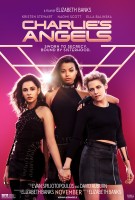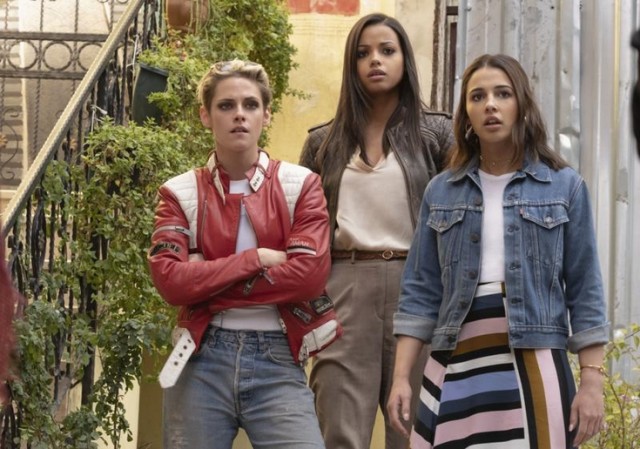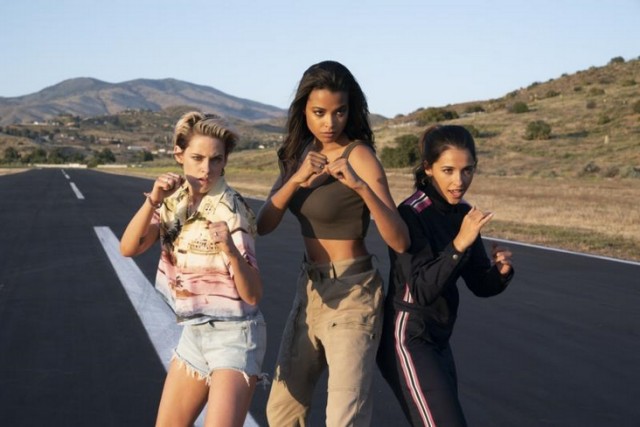Charlie's Angels (2019) Movie Review
 |
Charlie's Angels
Theatrical Release: November 15, 2019 / Running Time: 118 Minutes / Rating: PG-13 Director: Elizabeth Banks / Writers: Elizabeth Banks (screenplay); Evan Spiliotopoulos, David Auburn (story); Cast: Kristen Stewart (Sabina Wilson), Naomi Scott (Elena Houghlin), Ella Balinska (Jane Kano), Elizabeth Banks (Boz), Patrick Stewart (John Bosley), Djimon Hounsou (Edgar Bosley), Sam Claflin (Alexander Brok), Jonathan Tucker (Hodak), Nat Faxon (Peter Fleming), Chris Pang (Jonny Smith), Luis Gerardo M้ndez (Saint), Noah Centineo (Langston), Jaclyn Smith (Kelly Garrett), Danica Patrick (Driving Instructor), Ronda Rousey (Fight Instructor), Laverne Cox (Bomb Instructor), Hailee Steinfeld (Angel Recruit), Chloe Kim (Angel Recruit), Lili Reinhart (Angel Recruit), Aly Raisman (Angel Recruit), Huda Kattan (Angel Recruit) |
The new Charlie's Angels makes sense for a number of reasons. First of all, it's a known brand, less from the late '70s/early '80s ABC television series than the pair of hit movies released at the beginning of this century. Every major studio seems to have made peace with the fact that it's easier to sell tickets to something people already know than to try to hook them on something original. Secondly, strong female characters are more popular now than ever, Sure, the TV show was created by two men and produced by another. But in 2019, people feel better about having a woman tell women's stories. It just so happens that one woman -- Elizabeth Banks -- has climbed the industry's ladder and is in a position to write, direct, produce, and appear in this reboot.
The film opens with Sabina (Kristen Stewart) enduring an uncomfortable first date in which she has to defend a woman's ability to do anything a man can. Naturally, her date (Chris Pang) doesn't see what's coming when Sabina, Jane (Ella Balinska), and other "Angels" of the Townsend Agency thwart armed guards to deliver criminals to justice.
Our attentions then turn to Elena Houghlin (Naomi Scott), a brilliant MIT-educated engineer who has her legitimate concerns marginalized in a one-sided meeting with her clueless boss Peter Fleming (Nat Faxon). Fleming has his sights set on revolutionizing power with a game-changing invention, but Elena is worried that it could easily be exploited and weaponized.
Elena is sought out by a France-based Bosley (Djimon Hounsou) and finds herself being targeted by a silent yet deadly assassin (Jonathan Tucker). With that, Elena joins Sabina, Jane, and their newly assigned Bosley (Banks), the first Angel to be made "Bosley", all of them hoping to stay alive and keep the powerful prototypes at Elena's lab out of the hands of the bad guys.
Banks' Angels is easy to classify as an action comedy, although despite her background, it's more successful at the action than the comedy.
This new installment has a great deal less star power than the trio of Cameron Diaz, Drew Barrymore, and Lucy Liu at the heights of their popularity. Stewart's Q score currently reflects high familiarity but limited appeal. Every accomplished young actress has some vocal detractors online, even those as admirable as Jennifer Lawrence, Emma Watson, and Emma Stone. With Stewart, though, the problem is that her fame came from Twilight, a franchise of passionate and generally young fans who may not have ever been all that crazy about her. The promising young actress who critics admired in films like Into the Wild and Adventureland has continued to win them over with her collaborations with Olivier Assayas (Clouds of Sils Maria, Personal Shopper). Her performance in Charlie's Angels feels kind of like a defiant reaction to public opinion. Stewart's Sabina acknowledges that she is annoying and judging by the laugh it got (one of the movie's few big ones), viewers are apt to agree with that. Her rebellious, snarky tone throughout recalls the resentment some men held towards Brie Larson for comments she made in the press. Advance online hate for Captain Marvel pre-release, big enough to get Rotten Tomatoes to change their comments policy, ultimately did not seem to impact the bottom line of Larson's blockbuster origin movie. In that case, the love of Marvel Studios seems bigger than dislike for the Academy Award winning actress. I'm not convinced anyone is crazy enough about Charlie's Angels as a franchise to support this unconditionally. I'm not even sure Stewart has an active fanbase that still supports her as she approaches 30.
And yet, for better or probably worse, Stewart, the highest-paid actress in the world in 2010 and 2012, is by far the biggest name here. The UK's Balinska is unknown to date. Naomi Scott was the best thing about Disney's live-action Aladdin remake this year and she's also the best thing about this, her screen presence and good timing seemingly giving her all she needs to flourish as a leading lady.
Unfortunately, outside of Scott, there isn't a whole lot to enjoy about this endeavor. That's a shame because movies desperately need female voices. Having spent this year revisiting hundreds of great films from this century, it's absurd how few of them were directed or even just written by women. Banks' creative control here is admirable from the perspective of any human being valuing diversity in the medium. But that doesn't add appeal or entertainment value to a movie lacking in those departments. It does a disservice to all if we hold something to a lower standard simply because it is a significant venue for representation. Movies do not excel or fail based on the gender of the director. I'd be lying if I said I got more enjoyment out of Angels than in the two-minute trailer beforehand for Greta Gerwig's Little Women.
There are a couple of amusing gags and Banks proves to be perfectly passable as an action filmmaker, which nothing in her resume suggests. One gets the sense that the writer-director, who makes use of a story credited to Evan Spiliotopoulous and David Auburn, is more invested in these characters and their portrayals than McG ever was in his Angels. But that knowledge does nothing to keep this film an arm's distance away from painful with its assault of unlikable, unfamiliar pop music.
Some final notes: Angels pays tribute to the TV series and the McG movies early on in Photoshop form and with a late cameo. The end credits include further girl power cameos by the likes of Ronda Rousey, Danica Patrick, Laverne Cox, and Hailee Steinfeld. Patrick Stewart picks up his biggest film credit outside the Star Trek and X-Men universes as a retiring Bosley. |
Related Reviews:
DVDizzy.com | DVD and Blu-ray Reviews | New and Upcoming DVD & Blu-ray Schedule | Upcoming Cover Art | Search This Site
DVDizzy.com Top Stories:
Now in Theaters: Zombieland: Double Tap Maleficent: Mistress of Evil Motherless Brooklyn The Lighthouse Terminator: Dark Fate
Kristen Stewart: The Runaways Adventureland | Naomi Scott: Aladdin (2019) Lemonade Mouth
Elizabeth Banks: The Hunger Games: 4-Film Collection | Patrick Stewart: Logan
Text copyright 2019 DVDizzy.com. Images copyright 2019 Columbia Pictures, Perfect World Pictures, 2.0 Entertainment, Brownstone Productions, and Cantillon Company.
Unauthorized reproduction prohibited.

